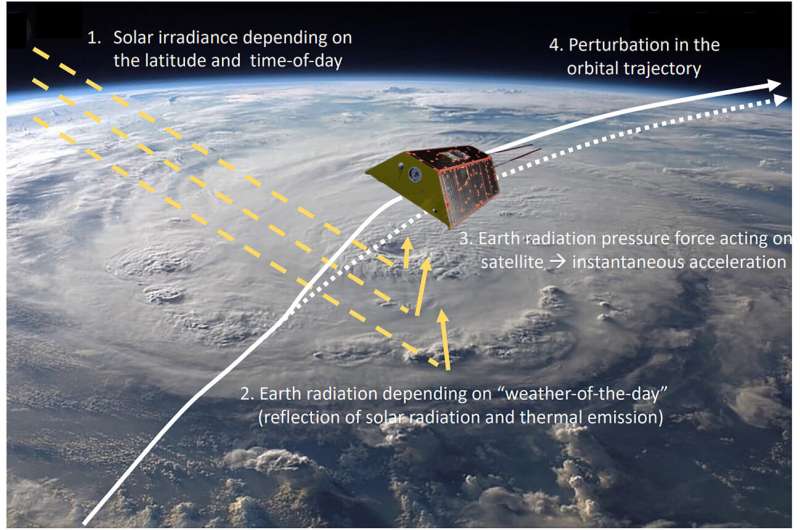This article has been reviewed according to Science X's editorial process and policies. Editors have highlighted the following attributes while ensuring the content's credibility:
fact-checked
peer-reviewed publication
trusted source
proofread
Weather prediction models can also forecast satellite displacements

New research finds that modern weather models can accurately predict satellite movements due to the energy emitted and reflected by the Earth. In addition to weather prediction, weather models can also help understand and predict how satellites respond to weather events, such as storms.
Researchers at the Institute for Atmospheric and Earth System Research (INAR) at the University of Helsinki have found that modern weather models can accurately predict the energy that Earth emits and reflects into space, which directly affects the movements of low Earth-orbiting (LEO) satellites.
By leveraging these models, the researchers gained insights into how LEO satellites respond to weather events below, such as tropical cyclones with tall and reflective clouds. The results were published in the Journal of Geophysical Research in April.
In the study, the researchers utilized numerical weather models. They are sophisticated computer simulators that predict future atmospheric conditions based on current observations and laws of physics.
"Numerical weather models not only simulate weather patterns but also calculate various parameters, including the Earth's energy emissions and reflections under various weather conditions.
"By analyzing these simulations, we sought to understand how changes in weather, such as cloud cover and storms, influence the movement of satellites, affecting their ability to fulfill their intended duties," says Sanam Motlaghzadeh, lead author of the study and doctoral researcher at INAR.
Improved satellite operations
The significance of the findings lies in their potential to enhance satellite tracking and control, improving the efficiency and reliability of satellite operations.
"Understanding how weather affects satellites also enhances the accuracy of satellite-based measurements used in climate studies. These findings address a critical challenge in satellite data reliability, namely, determining the precise orbits of satellites, on which the weather events have effect," Motlaghzadeh explains.
Satellites play a crucial role in monitoring vegetation, tracking water resources, and observing glacier evolution through various measurement techniques. These measurements, including image capture and height and gravity field measurements, are essential for studying climate change and its impacts.
A better understanding of satellite movements can also aid in climate monitoring and disaster management. Utilizing advanced weather models can further refine satellite-based measurements, facilitating more effective study and mitigation of environmental issues.
"Understanding how satellites interact with Earth's atmosphere offers valuable insights into our planet and how it changes over time. The findings contribute to more accurate satellite-based monitoring of terrestrial water resources, and hence to food security," Motlaghzadeh says.
More information: S. Motlaghzadeh et al, Weather‐Induced Satellite Orbit Perturbations, Journal of Geophysical Research: Atmospheres (2024). DOI: 10.1029/2023JD040009
Journal information: Journal of Geophysical Research , Journal of Geophysical Research - Atmospheres
Provided by University of Helsinki




















